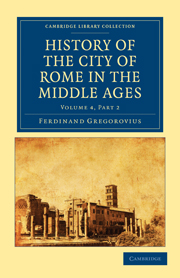CHAPTER VII
Published online by Cambridge University Press: 05 July 2011
Summary
Throughout the entire course of the twelfth century the intellectual life of Rome remained half barbarous as before; a fact which is sufficiently explained by the continued struggles of the Church with the emperors, or with the Roman people, the almost constant exile of the popes, and a series of revolutions in the city.
In the twelfth century the sacred chair was occupied by distinguished men, but among the sixteen popes who filled it, only four, and these by no means the greatest, were Romans by birth. Several of these men had received their education abroad, more especially in France, where, during the time of Abelard, Paris had become a celebrated school of dialectics and theology. We have already spoken of the close ties which existed between Rome and France after the time of the Frenchman Urban II. If in earlier times the order of Cluny had been the means of uniting the two countries, the great reorganisation of monasticism under Bernard of Clairvaux in the twelfth century made this alliance firmer and more permanent. Political and ecclesiastical relations closely bound the Papacy to a country which constantly offered it shelter.
- Type
- Chapter
- Information
- History of the City of Rome in the Middle Ages , pp. 639 - 700Publisher: Cambridge University PressPrint publication year: 2010First published in: 1896

